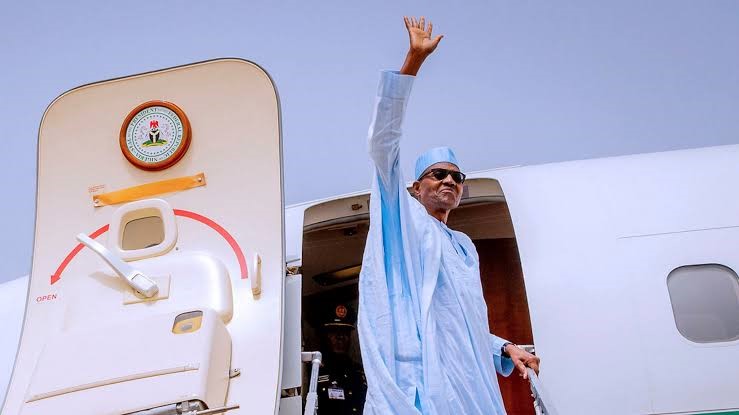[By Rachael Eni]
On the 19th of November, 2021, the National Assembly forwarded the Electoral Amendment Bill to President Muhammadu Buhari. What would eventually follow was a drama so unnecessary that it left me bewildered. Rather than assent or decline the Bill, the President chose instead to jet out of the country, spurring calls by concerned citizens and civil society organisations (CSOs) for the President to either return or for the National Assembly to ignore him and pass the bill into law.

For proper perspective, the provisions of Section 58 (4) of the 1999 Constitution (as amended) states that “Where the two Houses of the National Assembly have passed the Bill and present it to the President, he must signify if he Assents [Approves] to it or withholds his Assent [i.e disapproval] within a period of 30 days.”
For the President to wait until time had elapsed (Day 31) to decline assent to the bill when it could have been done earlier leaves me, as with many other Nigerians, with questions. But this isn’t the subject of this article. Moving on.
In the former version of the Bill passed by the National Assembly, the lawmakers prescribed that political parties use only the direct mode of primaries. This did not sit well with Mr President who cited insecurity, infringement on the rights of Nigerians to participate in governance, and the cost of conducting direct primaries as his reasons for declining assent. He further assured Nigerians that he will sign the Bill if changes are made to the clause, to allow political parties decide the best way to pick their candidates for elections.
Sequel to this, the lawmakers amended the controversial Clause 84 of the bill – which deals with the mode of primary election to be used by political parties to select candidates for elective offices, and transmitted it once again to the President who has now signed the Bill into law.
While we wait for the 2023 elections, which have been slated for February 25, 2023, we as citizens must understand the implications of this new amendment to the Electoral Bill, or at the very least familiarise ourselves with the concepts of consensus, direct and indirect primaries. The recently conducted Ekiti primaries by various political parties in the state featured all 3 types of primaries and offered relevant insights.
Direct, Indirect and Consensus
As the name implies, direct primaries typically involve the participation of all registered members of a political party in the selection of the party’s candidates. In the just concluded APC primaries for the Ekiti elections, the party adopted the direct mode where every card-carrying party member in Ekiti State was entitled to vote. Indirect primaries, on the other hand, rely on the use of delegates, who in most cases are political appointees or party leaders at different levels to choose the party’s flag bearer. The process of choosing delegates is mostly done at the ward level. These delegates then go on to represent their respective wards. The People’s Democratic Party (PDP) adopted the indirect mode of primaries.
Unlike the direct and indirect modes of primaries, primaries by consensus involve the unanimous endorsement of a candidate by all cleared aspirants. The Labour Party adopted Olugbenga Daramola as its consensus candidate for Ekiti.
While all modes of primaries certainly have their advantages, it can be argued that none of them is representative of the true will of the people—in this case, party members—and can be manipulated to suit those with vested interests.
In a clime such as ours, where party members do not want to appear disloyal to their principal or godfather, it becomes inevitable that party members will align with their respective leaders in their choice of candidates if the direct mode of primaries is deployed. It raises questions as to why time and resources should be expended if party members will eventually echo the choice of one man, for fear of being tagged disloyal. The emergence of Biodun Oyebanji, the alleged favourite candidate of Governor Fayemi, as the flagbearer of the All Progressives Congress (APC) in the forthcoming Ekiti elections, lays credence to this.
There is also the matter of the direct primaries being misused; the track record of direct primaries in the APC speaks to its negative use. In the 2021 Anambra gubernatorial elections, Andy Uba polled 230,201 votes to become the party’s flagbearer. Months later, during the elections, he polled a miserly 43,285 votes. What happened to 181,916 people that supposedly voted for him in the primaries?
In the APC primary election of October 2018, President Muhammadu Buhari, then APC presidential aspirant, secured 2,931,235 votes across the 484 wards in the 44 LGAs of Kano State — according to a statement by Abba Anwar, Chief Press Secretary to Abdullahi Ganduje, the governor of the state. In February 2019, the same person who had previously garnered almost 3 million votes won all Kano LGAs in the presidential election with 1,464,768 votes — less than 50 percent of the votes he polled in the primary election.
This inconsistencies leaves big questions as to the credibility of direct primaries, moreso when the voter’s register is manual and inaccessible to the public.
The consensus mode, on the other hand, takes away the only real power that members of political parties have, which is to vote in their preferred candidate to represent the party. Consensus mode subverts popular will as the nomination of candidates become the exclusive preserve of political gladiators within the party.
As with the other two, indirect primaries are also not foolproof. It is filled with loopholes that can be exploited, one of which is the ease of bribing party delegates to subvert the will of the people they represent and vote instead for the highest bidder. There are also concerns that the choice of delegates can be tilted to favour a candidate’s political interest. The emergence of Bisi Kolawole, the anointed candidate of former Governor Ayo Fayose, amid claims of alleged ‘compromise’ of the process in favour of Mr Fayose’s candidate, is one such example.
As the 2023 elections draw nigh,, we must begin to make our voices heard, especially as it concerns the type of candidates we will vote for. Candidates should be selected on the basis of these 5Cs – Competence, Capacity, Character, Courage & Compassion. No more incompetence. No more sentiments. Political parties must know that it is not fun and games, as usual.
It is important to note that the candidates we vote for are products of primaries, therefore, if we fail to signal the kind of candidates that we want so political parties can factor it in as they go into primaries, we will keep on complaining long after the elections have come and gone.
In the words of Marian Wright Edelman, “Democracy is not a spectator sport”. Get involved, make your voices heard, participate actively, prioritise candidates who only have a clear-cut road map for developing your respective states, but first, register to get your Permanent Voters Card (PVC). Without getting your PVC, you lose your chance to select competent candidates.
I end with the words of Peggy Noonan, “Our political leaders will know our priorities only if we tell them, again and again, and if those priorities begin to show up in the polls.”
 Rachael Eni is a content and editorial analyst based in Lagos. She can be reached at Chinemeremeni@gmail.com
Rachael Eni is a content and editorial analyst based in Lagos. She can be reached at Chinemeremeni@gmail.com
